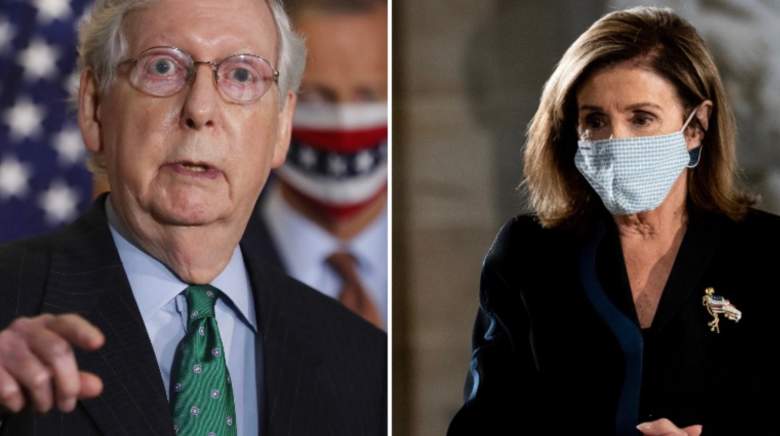
The next stimulus package hasn’t passed through Congress yet, but it might soon. In the past week, all of the key players in stimulus negotiations have signaled their relative optimism toward the chances of reaching a compromise with this next package.
House Speaker Nancy Pelosi and Treasury Secretary Steve Mnuchin have engaged in stimulus talks for the past week, with both parties indicating their enthusiasm for reaching a compromise. Then, on Friday, October 2, Senate Majority Leader Mitch McConnell offered an optimistic comment on the talks. McConnell has, up until this point, poured cold water on Pelosi and Mnuchin’s negotiations, calling the Democrats’ $2.2 trillion package “outlandish” at one point.
But on Friday, during an event in Kentucky, McConnell’s tune changed a bit. He said, per The New York Times, “I’m trying to figure out here whether I should predict another bill quickly or not, but the talks have speeded up in the last couple days. I think we’re closer to getting an outcome.”
Here’s what you need to know:
What Pelosi, Mnuchin & Others Have Said About the Need for Another Stimulus Package ASAP
Throughout the summer and into the fall, the president has repeatedly indicated his desire to provide the American people with another round of stimulus payments. On Friday, Chief of Staff Mark Meadows told reporters that a stimulus package was still on the president’s mind, even as he went to the hospital to be monitored following his positive COVID diagnosis.
Meadows said, in part, “(The president‘s) first question to me this morning was, ‘How is the economy doing? How are the stimulus talks going on Capitol Hill?’”
As for Mnuchin and Pelosi, they have both repeatedly signaled their optimism about reaching a compromise in the very near future. On Wednesday, September 30, Mnuchin confirmed that the idea of a second round of stimulus checks is a given with any upcoming package. During an interview with Fox Business, he said he’d “reached an agreement” with Democratic leaders on the topic of direct payments.
“If there is a deal there will be direct payments,” he said.
After his meeting with Pelosi September 30, Mnuchin told reporters outside the Capitol that they’d made “a lot of progress over the last few days” and also said, “We still don’t have an agreement, but we have more work to do. And we’re going to see where we end up.”
According to CNBC, Mnuchin said the White House had reached alignment with House Democrats on issues like direct payments, small business loans and airline aid. However, they still don’t align on issues like state and local government aid and liability protections for businesses, the news network reported.
Mnuchin and Pelosi had a second meeting on Thursday. They had a third meeting on Friday, The Times reported.
Members of the House left on Friday afternoon for their scheduled break with orders to be prepared to return to Congress for a potential stimulus package vote and to expect 24 hours notice if that should happen. Per The Times, Pelosi sent a letter to House Democrats outlining the key differences she and Mnuchin were still working through: the dollar amount of spending, the amount of jobless aid, funding amounts for schools and state/local governments, child tax credits and funds for tracing/testing the virus.
In the letter, Pelosi said to her fellow House Democrats, “We’ll find our middle ground — we’re legislators. We’ll get the job done.”
What’s in the Democrats’ $2.2 Trillion Package? What’s in Mnuchin’s $1.6 Trillion Package?
During negotiations, Pelosi and Mnuchin have been working to reach a compromise between their two packages. Pelosi’s package would provide an estimated $2.2 trillion in funding, while Mnuchin’s White House-backed package would offer closer to $1.6 trillion.
Here’s a sample of what’s in the $2.2 trillion package:
$436 billion in emergency aid for state and local governments
$225 billion in funding for schools and child care
An extension of $600 federal unemployment payments through January
$75 billion for COVID-19 testing
$25 billion in airline relief, to avoid tens of thousands of layoffs
Another round of $1,200 direct payments
As for the White House’s $1.6 trillion plan, it works as a sort of counter-offer to the Democrats’ plan. A number of the measures amount to putting less funding toward the same issues.
Here’s a sample of what’s included in the $1.6 trillion plan:
$250 billion in funding for state and local governments
An extension of $400 federal unemployment benefits
$150 billion in educational funding
$175 billion in health care aid
$10 billion in aid for the Post Office
READ NEXT: Bill Stepien, Trump’s Campaign Manager, Tests Positive for COVID-19